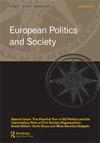转型、民粹主义和民主衰落:来自匈牙利和捷克共和国的证据
Q1 Social Sciences
引用次数: 5
摘要
虽然在过去的十年里,匈牙利和捷克都出现了民粹主义者掌权的情况,但只有匈牙利的民主制度和法治质量出现了明显的恶化。1989年之后不同的过渡环境,特别是宪法选择和过渡时期司法措施的不同,有助于解释匈牙利政治在2010年大选之前的分裂、两极分化和信任侵蚀。再加上极不相称的选举制度,这些结构性因素使匈牙利比捷克共和国更容易出现维克多Orbán统治下的去民主化。本文章由计算机程序翻译,如有差异,请以英文原文为准。
Transitions, populism, and democratic decline: evidence from Hungary and the Czech Republic
ABSTRACT
Although both Hungary and the Czech Republic have seen populists arrive in power over the past decade, only Hungary has experienced a measurable deterioration in the quality of its democratic institutions and rule of law. The different circumstances of the transition after 1989, particularly the differences in constitutional choices and transitional justice measures, help explain the cleavages, polarization, and erosion of trust that characterized Hungarian politics in the run up to the 2010 election. Jointly with a highly disproportionate electoral system, these structural factors made Hungary more prone to the de-democratization observed under Viktor Orbán than the Czech Republic.
求助全文
通过发布文献求助,成功后即可免费获取论文全文。
去求助
来源期刊

European Politics and Society
Social Sciences-Political Science and International Relations
CiteScore
4.20
自引率
0.00%
发文量
35
期刊介绍:
The editors of European Politics and Society welcome the submission of high quality articles on all aspects of European Politics, widely defined to include, comparative politics, political sociology, social policy, international relations, security, and modern history. The geographical scope of the journal covers all parts of Europe including the Russian Federation. The Journal also welcomes proposals for special thematic issues. For further guidelines on submission of special issue proposals, please see the Instructions for Authors page. All articles will be subject to a rigorous double-blind peer review process by a minimum of two referees.
 求助内容:
求助内容: 应助结果提醒方式:
应助结果提醒方式:


